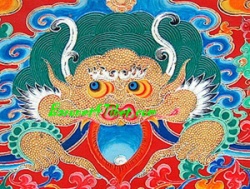Difference between revisions of "Zeeba"
(Created page with "thumb|250px| Zeeba or Zipak (Tibetan) The Zipak originates in a Shaivite legend from the Shandha {{Wiki|Purana}}. S...") |
|||
| Line 1: | Line 1: | ||
[[File:zeeba111.JPG|thumb|250px|]] | [[File:zeeba111.JPG|thumb|250px|]] | ||
| − | [[Zeeba]] or [[Zipak]] ([[Tibetan]]) The Zipak originates in a [[Wikipedia:Shaivism|Shaivite]] legend from the Shandha {{Wiki|Purana}}. [[Shiva]] created a {{Wiki|demon}} called [[Jalandhara]] from the blaze of his [[third eye]]. [[Jalandhara]] assumed great power and [[desired]] an [[incestuous]] relationship with [[Parvati]], the [[consort]] of [[Shiva]] and Jalandhara's adoptive mother. [[Jalandhara]] persuaded [[Rahu]], one of his {{Wiki|demonic}} friends, to demand Parvati's favor. When [[Shiva]] got [[wind]] of this, he was understandably outraged, so his [[third eye]] blazed again, thereby creating the Zeeba, who made a beeline to devour [[Rahu]]. [[Rahu]] decided that Zeeba was going to eat him bones and all and begged [[Shiva]] for [[mercy]]; whereupon, [[Shiva]] [[offered]] [[forgiveness]] and called off Zeeba. Because Zeeba had not had anything to eat since coming into the [[world]] and had been deprived of his only prey, he turned on himself and devoured his own [[body]] until only the head and hands remained. [[Shiva]] was very [[pleased]] with his handiwork and invited Zeeba to remain as the guardian to his door. Since then, he has become a reminder of the consequences of gluttony and [[greed]] and also stands as a guardian of practitioners. Zeeba's fingers point to his missing [[body]] to show what can happen when someone is overcome by [[avarice]]. | + | |
| + | |||
| + | |||
| + | |||
| + | |||
| + | |||
| + | [[Zeeba]] or [[Zipak]] ([[Tibetan]]) The [[Zipak]] originates in a [[Wikipedia:Shaivism|Shaivite]] legend from the Shandha {{Wiki|Purana}}. [[Shiva]] created a {{Wiki|demon}} called [[Jalandhara]] from the blaze of his [[third eye]]. [[Jalandhara]] assumed great power and [[desired]] an [[incestuous]] relationship with [[Parvati]], the [[consort]] of [[Shiva]] and Jalandhara's adoptive mother. [[Jalandhara]] persuaded [[Rahu]], one of his {{Wiki|demonic}} friends, to demand [[Parvati's]] favor. When [[Shiva]] got [[wind]] of this, he was understandably outraged, so his [[third eye]] blazed again, thereby creating the [[Zeeba]], who made a beeline to devour [[Rahu]]. [[Rahu]] decided that [[Zeeba]] was going to eat him [[bones]] and all and begged | ||
| + | |||
| + | |||
| + | [[Shiva]] for [[mercy]]; whereupon, [[Shiva]] [[offered]] [[forgiveness]] and called off [[Zeeba]]. Because [[Zeeba]] had not had anything to eat since coming into the [[world]] and had been deprived of his only prey, he turned on himself and devoured his [[own]] [[body]] until only the head and hands remained. [[Shiva]] was very [[pleased]] with his handiwork and invited [[Zeeba]] to remain as the guardian to his door. Since then, he has become a reminder of the {{Wiki|consequences}} of gluttony and [[greed]] and also stands as a guardian of practitioners. Zeeba's fingers point to his missing [[body]] to show what can happen when someone is overcome by [[avarice]]. | ||
{{R}} | {{R}} | ||
Revision as of 10:19, 6 January 2024
Zeeba or Zipak (Tibetan) The Zipak originates in a Shaivite legend from the Shandha Purana. Shiva created a demon called Jalandhara from the blaze of his third eye. Jalandhara assumed great power and desired an incestuous relationship with Parvati, the consort of Shiva and Jalandhara's adoptive mother. Jalandhara persuaded Rahu, one of his demonic friends, to demand Parvati's favor. When Shiva got wind of this, he was understandably outraged, so his third eye blazed again, thereby creating the Zeeba, who made a beeline to devour Rahu. Rahu decided that Zeeba was going to eat him bones and all and begged
Shiva for mercy; whereupon, Shiva offered forgiveness and called off Zeeba. Because Zeeba had not had anything to eat since coming into the world and had been deprived of his only prey, he turned on himself and devoured his own body until only the head and hands remained. Shiva was very pleased with his handiwork and invited Zeeba to remain as the guardian to his door. Since then, he has become a reminder of the consequences of gluttony and greed and also stands as a guardian of practitioners. Zeeba's fingers point to his missing body to show what can happen when someone is overcome by avarice.
